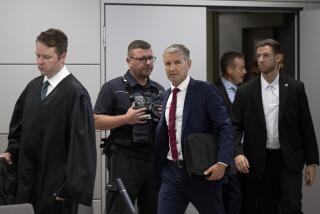Prosecutors Drop Investigation of Fischer’s Ties to Terrorists
- Share via
BERLIN — Prosecutors in Hesse state announced Monday that they have dropped their investigation of Foreign Minister Joschka Fischer, rejecting accusations that he gave shelter to a terrorist in the 1970s, then lied about it during court testimony earlier this year.
The decision dispels a cloud of suspicion that has hovered over Germany’s vice chancellor--and one of its most popular politicians--since his street-fighting past came back to haunt him at the trial of a fellow radical from that era, Hans-Joachim Klein.
Opposition calls for Fischer’s resignation never found much resonance in this country where many leaders went through phases of radical leftist exuberance in their youth.
But as Fischer’s Greens party has been struggling in recent state elections and been held accountable for the spread of “mad cow” disease to German livestock, the scandal was another drag on the fortunes of the party, which shares power with Chancellor Gerhard Schroeder’s Social Democrats.
Now 53 and the picture of propriety in his three-piece suits and half-moon glasses, Fischer had nothing to say in reaction to the news that an investigation launched Feb. 19 had found no grounds for prosecution. However, his party’s business manager, Katrin Goering-Eckardt, said the decision was expected and accused political opponents of “an unprecedented campaign of defamation and agitation.”
Authorities in Frankfurt ordered the investigation after Fischer testified Jan. 16 as a character witness for Klein, who was on trial for his part in a 1975 terrorist raid on an Organization of the Petroleum Exporting Countries meeting in Vienna in which three hostages died. Klein, who lived as a fugitive until his 1998 arrest in France, was sentenced Feb. 15 to nine years in prison.
During his testimony, Fischer was asked if he had provided shelter for other radicals of the early 1970s, specifically Margrit Schiller, a convicted Red Army Faction terrorist who now lives in Uruguay. Fischer said Schiller had never lived in the communal apartment he shared with fellow radicals in 1973, but informants later contradicted that statement in letters sent to the Hesse state prosecutor’s office. Schiller’s autobiography also mentions that she had “breakfasted” in the apartment, which was mainly inhabited by Fischer and his longtime friend, Daniel Cohn-Bendit, another radical-turned-establishment politician now serving in the European Parliament.
Cohn-Bendit accused Hesse state officials of political motivations for opening the investigation into Fischer’s past, as Hesse is governed by the opposition Christian Democratic Union.
If prosecutors had discovered cause for charges, the maximum penalty would have been five years in prison.
More to Read
Sign up for Essential California
The most important California stories and recommendations in your inbox every morning.
You may occasionally receive promotional content from the Los Angeles Times.














